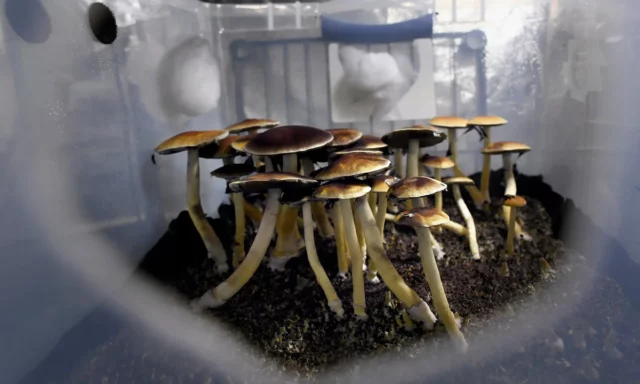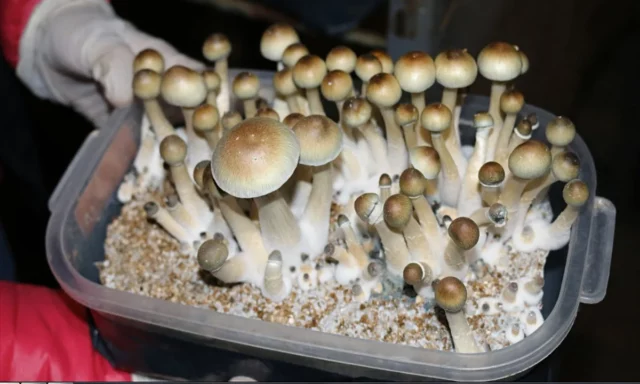The functioning of the human brain is highly complex, and this implies that a wide variety of substances and chemical elements participate in it. Normally, these tiny compounds work in a coordinated way, maintaining a certain balance in mental processes. However, there are some substances that, when they arrive from outside the body, totally alter the functioning of neurons.
Psilocybin is one of those compounds that, upon entering the nervous system, profoundly affects its overall functioning. Specifically, it is famous for its psychoactive effect. In this article, we will look at what psilocybin is, what its effects are, and why hallucinogenic mushrooms containing it have become popular.
What is psilocybin?
Psilocybin is an alkaloid found naturally in certain types of mushrooms, which are known to be hallucinogenic mushrooms. The consumption of these mushrooms as a recreational drug is due to their hallucinogenic effects, which lead many people to ingest the mushrooms for the mere interest that these experiences arouse; some users define it as dreaming or becoming aware of other realities, using a lexicon linked to mysticism.
However, the effects of psilocybin need not be explained by mentalistic and dualistic beliefs. In fact, although it is not known exactly what happens when this substance enters the brain, the basic mechanisms by which it causes transient syndromes based on hallucinations are known. Let’s see it.
How does it act in the brain?
The brain is partly made up of neurons, which communicate with each other by exchanging a series of chemicals called neurotransmitters. The amount and timing with which a neuron receives different types of neurotransmitters determines what its activation pattern will be, which in turn will be “chained” to other nerve cells that will end up releasing neurotransmitters, etc.
Psilocybin causes at least one of these neurotransmitters, serotonin, to have stronger effects on certain neurons. Let’s say that this psychoactive compound has an agonistic effect on serotonin, since it causes more neuronal receptors to trigger a type of activation that should only occur when this substance is present in normal amounts.
The fact that these neurons receive orders from serotonin that are at the wrong time and do not start from the balance maintained by the body itself causes hallucinations to appear.

The effects
The main effects of psilocybin begin between 15 and 50 minutes after orally consuming the substance (although it also depends on the state of the stomach), and can last up to 8 hours.
There are studies that suggest that among the common effects of this psychoactive substance is the different experimentation of the passage of time, causing it to pass faster or slower than normal, or even creating moments of confusion by giving the impression that has entered a time loop.
Expands neural connectivity
Psilocybin causes parts of the brain that are normally not very connected to each other to start exchanging signals more frequently. This causes the quality of the perception of the environment to change completely.
It is, on a large scale, something that is quite similar to what happens in people with synesthesia, a phenomenon by which sensory modalities mix with each other, causing, for example, certain sounds to be perceived while evoking the perception of a different color for each of them.
Specifically, some of the parts of the brain in which signs of greater connectivity are seen are the hippocampus and the cingulate cortex, areas linked to the storage of memories belonging to declarative memory, on the one hand, and to experiencing emotions and creating of plans, on the other.
Causes hallucinations
It is the central characteristic of psilocybin as an element belonging to psychoactive drugs. These hallucinations can be visual, auditory, tactile and of all kinds.
Generates mystical experiences
The hallucinations that occur with psilocybin are not simply “movies” that the user attends as a spectator. On many occasions, the person who has eaten hallucinogenic mushrooms becomes emotionally involved with what they see, hear and touch, to the point of believing that everything is as real or more real than what they experienced before taking the drug. This causes some of the hallucinations to be interpreted as divine revelations, or breaks in reality, through which another alternative reality appears.

Its long-term effects: personality changes
There is evidence that the consumption of psilocybin is capable of producing permanent changes in the mental processes of the user. Specifically, personality changes. Normally these changes are linked to a tendency to be curious about what is new, surely motivated by experiences related to hallucinations.
Does it have therapeutic potential?
Research is currently being conducted to explore the potential therapeutic potential of psilocybin and other hallucinogen compounds and drugs such as LSD. However, due to its recent nature (until not so long ago, research along these lines was not allowed in many countries), there are still no conclusive results, although there are reasons to believe that these resources may be useful in clinical practice in the future.

